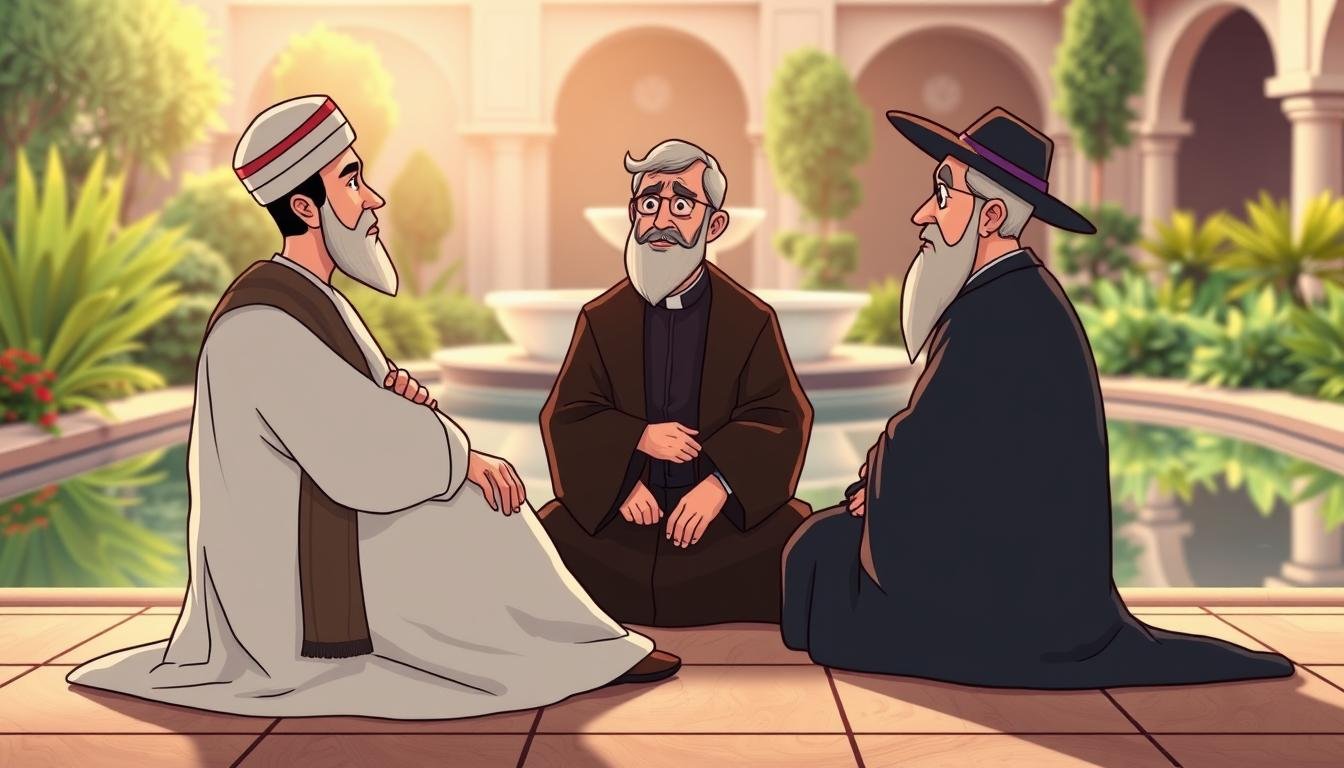Imagine standing between the Quran and the Bible, wondering if they can guide your life together. Over 4 billion people worldwide face this question. They are drawn to the shared values of the Abrahamic religions but struggle with theological divides.
I’ve seen friends and neighbors struggle with this. They ask: How can we honor both traditions without choosing one?
Islam and Christianity share roots in Abraham’s faith. Yet, their beliefs about God’s nature are very different. With 2.3 billion Christians and 1.9 billion Muslims, these traditions shape billions of lives. Can their truths coexist in one heart?
For those seeking a dual religious identity, the answer lies in understanding where these paths meet and part ways.
Some find hope in shared stories. Both faiths revere Jesus as a prophet and Messiah. Both call on Allah—the Arabic name for God shared by millions of Arabic-speaking Christians.
Yet, the Trinity’s role in Christianity and Islam’s strict monotheism create a big gap. How do we respect these differences while fostering mutual respect? This journey asks us to listen deeply to both traditions—and to one another.
The Fundamental Beliefs of Islam and Christianity
Understanding the monotheistic faiths of Islam and Christianity is key. Both have roots in Abrahamic revelation but differ in core teachings. For example, Muslims see Jesus as a prophet but not as God, a big difference in Islamic Christian beliefs.
Core Islamic Beliefs and Practices
Islam focuses on tawhid, the oneness of Allah. It has Five Pillars: prayer five times a day, fasting in Ramadan, and a pilgrimage to Mecca. The Quran guides Muslims, seen as unchanged.
Muslims view Jesus as a respected prophet. They believe he received the Injil, but it may have changed over time. This view shapes their approach to scripture and divine revelation.
Essential Christian Doctrines and Traditions
Christianity is built on the Trinity—God as Father, Son, and Holy Spirit. The New Testament tells of Jesus’ teachings and resurrection. This is the basis of salvation through faith in him.
Over 2.3 billion Christians believe in grace over good deeds. This contrasts with Islam’s focus on doing right. The phrase “God is love” (1 John 4:16) shows a big difference from the Quran’s view of Allah’s favor.
Where the Faiths Diverge Theologically
Big differences appear in how each faith sees salvation and God. Islam emphasizes following divine commands, while Christianity focuses on grace through Christ’s sacrifice. The Quran doesn’t talk about unconditional love, unlike the Bible.
These differences are not small. They affect how believers worship, live in community, and view the afterlife.
Theological Perspectives on Religious Exclusivity
Interfaith dialogue centers on the idea of religious exclusivity. This means one faith believes it has the only truth. Islamic theology says Allah is one and cannot have partners, which goes against the Christian belief in the Trinity.
The Christian view of Allah shares a common divine essence with Islam. But, they disagree on Jesus’ divinity. This disagreement splits their paths.
Islam’s core texts stress unity. The Quran says, “There is no god but Allah”. The hadith also warn against straying from truth. On the other hand, Christian scripture like John 14:6 says Jesus is the only way to salvation.
Both traditions see their truths as exclusive. Yet, they also recognize prophets like Muhammad and Jesus.

Recent surveys show changing views. While 60% of Muslims believe salvation comes only through Islam, 40% of young people want to talk across faiths. This mirrors past debates, where early Islamic scholars argued about exclusivity. Today, thinkers try to balance faith with openness to others.
The Christian view of Allah as one God contrasts with Islam’s rejection of the Trinity. Yet, both share values like charity and justice.
Can these views live together? The Quran encourages Muslims to discuss faith kindly (16:125). This suggests talking over strict beliefs. As we look at personal identity and shared values later, this debate on religious exclusivity and respect will stay key. How do these old beliefs shape today’s followers?
Can I Be Muslim and Christian? Examining the Core Question
At the heart of this question lie three unyielding theological divides. Let’s break down how these differences shape the possibility—or impossibility—of holding both identities.
“The Messiah, Jesus son of Mary, was only a messenger of Allah” (Quran 4:171).
Monotheism vs. Trinity: The Central Theological Challenge
Islam’s core tenet, Tawhid, rejects any division in God’s essence. Christianity’s Trinity doctrine—that God exists as three persons—contradicts this. The Quran condemns trinitarian concepts, stating, “They have definitely disbelieved who say, ‘Allah is the third of three’” (5:73). Quran). Emphasis added).). This clash isn’t abstract; it defines how adherents view reality itself. For example, 78% of Christians globally affirm Jesus’s resurrection (Barna Group, 2020)—a belief incompatible with Islamic teachings.
The Status of Jesus: Prophet or Divine?
In Islamic tradition, Jesus (Isa) is a revered prophet—miracle worker and Messiah—but emphatically human. The Quran calls him “Allah’s word” and “a servant” (4:171-172). The Islamic Jesus embodies compassion and obedience, not divinity. This contrasts sharply with Christian teachings where Jesus is God incarnate. Pew Research notes 53% of Muslims globally see other faiths as misguided on this point.
Salvation Concepts in Both Faiths
Salvation paths diverge fundamentally. Christianity teaches salvation through faith in Jesus’ sacrifice. Islam emphasizes deeds, faith in prophets, and submission to Allah. For 70% of Muslims, adherence to the Five Pillars is the path to Paradise (Pew Research). 2023). Christians, on the other hand, tie salvation to personal faith in Christ. These distinctions reflect deeper truths: each tradition’s worldview hinges on irreconcilable foundations.
Historical Interactions Between Islam and Christianity
Early meetings between Muslims and Christians show a path of religious compatibility. The Prophet Muhammad met Monk Bahira in Syria when he was young. This meeting showed the start of talks between the two faiths.
In 628 CE, a group of 60 Christians came to Medina. They talked with the Prophet for days. He promised to protect their faith and property, showing a way for different faiths to live together.
Periods of Coexistence and Conflict
Places like Cordoba and Baghdad were centers of learning. Scholars there translated Greek texts, mixing knowledge from different faiths. But, wars like the Crusades and Ottoman-Venetian conflicts also happened.
Even in hard times, people like Sultan Malik al-Kamil and Francis of Assisi met in 1219. They showed respect for each other, even when they were on opposite sides of a war.
Interfaith Dialogue Through the Centuries
The Quran talks about Mary and Jesus in a good way. This shows that Muslims and Christians have things in common. Medieval treaties and today’s efforts like A Common Word also show this.
Today, over 57% of Muslims and Christians live in Africa, Asia, and the Americas. This creates new chances for understanding each other.
History shows that politics can affect how faiths get along. But, it also shows that curiosity and respect can lead to peace. As we face today’s challenges, these stories remind us of the power of shared religious values in finding peace.
Shared Values and Common Ground
At the heart of shared religious values is a Quranic verse from Surah Al-Baqara 2:62. It says righteous followers of earlier traditions, like Christians, are included in Allah’s promise of reward. This shows that Abrahamic religions have a common base of monotheism, living right, and fairness. But how do we turn these beliefs into real unity?
The Golden Rule is a key example. It says to treat others as you would like to be treated. Both faiths teach this, even if they say it differently. The Quran talks about helping the hungry and spreading peace. Jesus says to love your neighbors as yourself.
These teachings are not just ideas. They are actions we should take. For example, in Singapore, 700 Muslims and Christians came together for Iftar. This shows the “mutual respect” Elder Cook talked about at the Sheikh Zayed Grand Mosque in Abu Dhabi.
Working together across faiths is not just spiritual. It’s also smart. When Catholic Relief Services works with Muslim charities to help refugees, they follow what both scriptures say. They care for “orphans, widows, and travelers” (Quran 2:215).
The Berkley Center’s research shows that working together on goals like helping the poor or solving conflicts can bridge differences. Even big differences like the Trinity or who is a prophet seem small compared to working together on big issues.
As a teacher, I see this unity in class. Muslim and Christian students discuss ethics, not just beliefs. Their debates show that loving God and others is more than just following rules. Let’s use our shared values to build bridges, not to ignore our differences. This way, we honor our shared humanity.
Religious Syncretism: Combining Faith Traditions
Religious syncretism shows that faith doesn’t have to be separate. It lets communities mix traditions in new ways. This can lead to innovation or conflict.
In places like Nigeria, Chrislam combines prayer and scripture. But it’s a delicate balance between sharing and changing beliefs.
“The Quran does not have a ‘family tree’ relationship with Judaism and Christianity should not be considered pejorative. If the Quran is neither subsidiary nor family tree, Christians can view Islam as distinct, not a heresy.”

Examples of Religious Syncretism Around the World
In Latin America, Catholicism meets Indigenous rituals. Afro-Caribbean practices like Santería mix Yororuba gods with Christian saints. In Nigeria, Chrislam blends Quranic verses with the Lord’s Prayer for unity.
In the U.S., places like Heartsong Church in Cordova, Tennessee, welcome Muslim prayers. This shows interfaith spirituality in action. But it also raises questions: Does mixing traditions weaken faith, or celebrate shared human values?
Theological Boundaries and Flexibility
Some scholars fear religious syncretism could blur doctrine. For example, the Quranic Al-Fatihah is key in Islam, but not in Christianity. Ibn Kathir’s views highlight the differences.
But, others see value in shared spaces for prayer. They believe it doesn’t undermine faith. Yet, when core beliefs like Jesus’ divinity are at stake, syncretism can lead to confusion.
Personal Identity and Dual Religious Practice
Exploring dual religious identity means balancing cultural traditions with beliefs. Many embrace rituals like fasting during Ramadan or celebrating Easter. But they don’t fully adopt all beliefs. This raises a question: Can we honor our heritage without giving up our beliefs?
Cultural vs. Theological Religious Identity
Cultural practices often come before beliefs. A Muslim-Christian family might share iftar meals and Christmas carols. Yet, they keep their theological differences. Sociologist Steve Bruce says such dual identity is rare, but cultural blending is common.
Do we have to agree on all beliefs to join a faith community? Or can rituals help bridge differences?
Navigating Family and Community Expectations
Interfaith families often face disagreements—27% of American couples disagree on beliefs. Young Muslims and Christians feel caught between family and community expectations. Pew data shows 30% of dual-identifying youth feel left out by both sides.
How do we balance belonging to a community with growing spiritually? Religious freedom is about respecting these journeys. As more seek to connect faiths, we need to create spaces for cultural respect and theological honesty. The way forward is through mutual learning, not just shared practices.
Contemporary Approaches to Interfaith Spirituality
Today, interfaith spirituality is a bridge between traditions. It doesn’t force everyone to agree on everything. The 2017 book *Contemporary Muslim-Christian Encounters* talks about how dialogue can deepen faith.
This isn’t about mixing religions. It’s about respecting differences and finding common values like justice. In Bosnia, cross-faith programs have helped heal after long conflicts.
The Prophet Muhammad’s Constitution of Medina is a guide. It set equality and peace as goals. These ideas are important today, as we face crises like in Syria or Myanmar.
Education is vital. Studies in the Democratic Republic of Congo and the UK show that teaching shared values can reduce hate. Tools like comparative theology help us grow without losing our beliefs.
Interfaith spirituality is not just possible; it’s a must. Let’s learn from the past and find new ways to respect each other.
FAQ
Is it possible to practice both Islam and Christianity simultaneously?
What are the core teachings of Islam?
How does Christianity define its beliefs?
Why are monotheism and the Trinity significant barriers between Islam and Christianity?
In what ways do Islam and Christianity exhibit shared values?
What historical interactions have shaped the relationship between Islam and Christianity?
How can cultural identity influence religious practice?
What is religious syncretism, and how does it occur?
What are contemporary approaches to interfaith spirituality?

Embracing Faith, One Insight at a Time!
The teachings of the Quran have always guided my path. With a deep passion for Islamic knowledge, I strive to blend the wisdom of tradition with the relevance of today, making the timeless messages of Islam accessible and meaningful for everyone.
Muslim Culture Hub is my platform to share historical insights and thought-provoking articles, exploring both well-known and lesser-discussed aspects of Islamic culture and beliefs. My mission is to create an inclusive online space where everyone can learn, strengthen their faith, and connect with the profound message of Islam.
Join the journey!
May peace be upon you.








